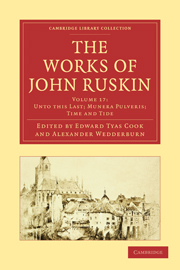Book contents
- Frontmatter
- Contents
- LIST OF ILLUSTRATIONS
- INTRODUCTION TO THIS VOLUME
- PART I “UNTO THIS LAST” (1860)
- PART II “MUNERA PULVERIS” (1862, 1863)
- BIBLIOGRAPHICAL NOTE
- CONTENTS
- PREFACE (1872)
- TEXT (WITH ADDITIONAL PASSAGES FROM THE ESSAYS IN “FRASER'S MAGAZINE”)
- PART III “TIME AND TIDE, BY WEARE AND TYNE” (1867)
- APPENDIX: LETTERS AND PAPERS ON ECONOMIC SUBJECTS 1863–1873
- Plate section
TEXT (WITH ADDITIONAL PASSAGES FROM THE ESSAYS IN “FRASER'S MAGAZINE”)
Published online by Cambridge University Press: 05 November 2011
- Frontmatter
- Contents
- LIST OF ILLUSTRATIONS
- INTRODUCTION TO THIS VOLUME
- PART I “UNTO THIS LAST” (1860)
- PART II “MUNERA PULVERIS” (1862, 1863)
- BIBLIOGRAPHICAL NOTE
- CONTENTS
- PREFACE (1872)
- TEXT (WITH ADDITIONAL PASSAGES FROM THE ESSAYS IN “FRASER'S MAGAZINE”)
- PART III “TIME AND TIDE, BY WEARE AND TYNE” (1867)
- APPENDIX: LETTERS AND PAPERS ON ECONOMIC SUBJECTS 1863–1873
- Plate section
Summary
1. As domestic economy regulates the acts and habits of a household, Political Economy regulates those of a society or State, with reference to the means of its maintenance.
Political economy is neither an art nor a science; but a system of conduct and legislature, founded on the sciences, directing the arts, and impossible, except under certain conditions of moral culture.
2. The study which lately in England has been called Political Economy is in reality nothing more than the investigation of some accidental phenomena of modern commercial operations, nor has it been true in its investigation even of these. It has no connection whatever with political economy, as understood and treated of by the great thinkers of past ages; and as long as its unscholarly and undefined statements are allowed to pass under the same name, every word written on the subject by those thinkers—and chiefly the words of Plato, Xenophon, Cicero, and Bacon—must be nearly useless to mankind. The reader must not, therefore, be surprised at the care and insistance with which I have retained the literal and earliest sense of all important terms used in these papers; for a word is usually well made at the time it is first wanted; its youngest meaning has in it the full strength of its youth; subsequent senses are commonly warped or weakened; and as all careful thinkers are sure to have used their words accurately, the first condition, in order to be able to avail ourselves of their sayings at all, is firm definition of terms.
- Type
- Chapter
- Information
- The Works of John Ruskin , pp. 147 - 294Publisher: Cambridge University PressPrint publication year: 2010First published in: 1905



